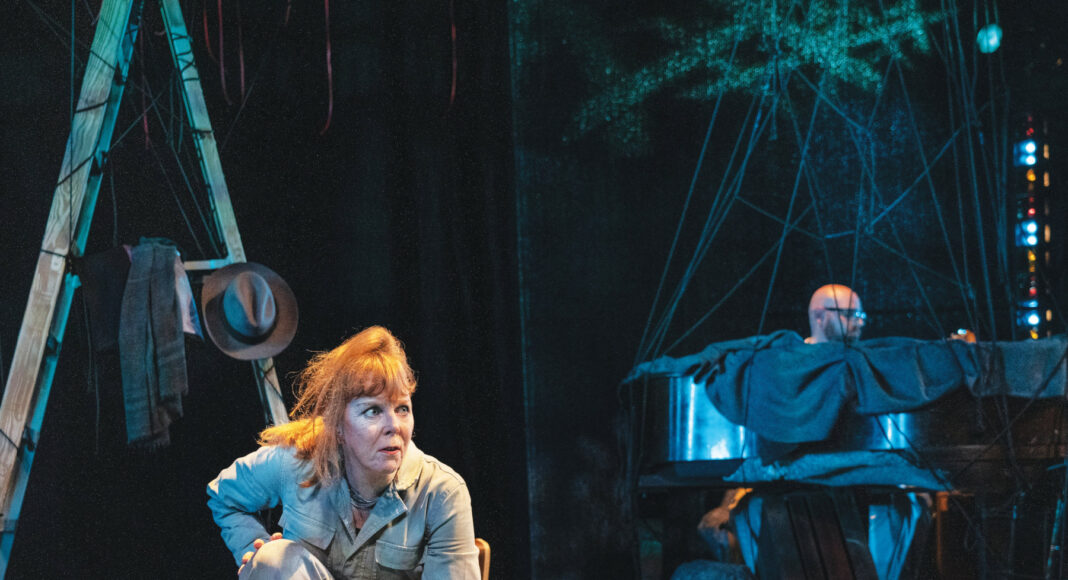Possibly the greatest story ever told about human folly, Homer’s Iliad sings of the entwining hubris and rage that led to the Trojan War three millennia ago. In the Jewel Theatre’s production of An Iliad, by Lisa Peterson and Denis O’Hare, a lone poet recounts, reenacts and refreshes the ecstatic energy of the 10-year conflict between the Greek hero Achilles and the Trojan’s great warrior Hector. Deeply flawed and deeply human, the mythic characters have been drawn from the highly readable Robert Fagles translation, and reimagined.
As the play opens, a lone poet takes the stage and calls upon the Muses for help to once more sing the song of rage, a song sung across the ages. As performed by a spectacular Patty Gallagher, the tale becomes as shocking and vivid as footage of the current war raging in Ukraine. This is a part Willem Dafoe would kill for. But I can’t imagine he could do it as well.
We see the endless armada of ships in that wine-dark sea, the tens of thousands of soldiers battling on blood-soaked shores, the bickering of Achilles and his general, the atrocities on both sides. It is Homer’s epic poem come to life through the extraordinary physical skills of Gallagher and her treasury of gestures, but it’s also a tour de force punctuated with asides in contemporary language, inflected with humor and visual puns. Lighting design by David Lee Cuthbert becomes an effective player in what is essentially a one-person show. As Gallagher points, lights flash. As the battlefield blooms with corpses, the air glows blood red.
The success of this bold theater piece depends entirely upon the central player, and in this case Gallagher delivers a master class in full-body acting. She is not only vocally flawless, but infinitely inventive in giving new voices to each character described. Shifting accents, changing walks, stances, pitch, volume. But more than that. Gallagher—in league with director Kirsten Brandt—unleashes an arsenal of gestural leitmotifs, much as Richard Wagner does for his mythic opera themes and characters. Death has its own choreography, as does the forging of armor and the hacking of limbs. So do Achilles, Hector, Hecuba, Priam and on and on. The motifs help to keep each mythic character distinct to the audience.
It is such a dazzling—and yes, epic—performance that one wonders why so much stage space was squandered. The only other figure on the stage plays the poet’s Muse, sitting at the piano and plunking out tuneless sounds. He then takes up a guitar and plays what are intended to be mood-inducing sounds. Not speaking, nor adding any substance. Another instrument—a single guitar or double bass—would have been more effective and less distracting. Same for the square banners dangling from the ceiling. Visually distracting. Ditto the sheer scrim, and wires and ropes. All in all, the set felt cluttered. A bare stage, one or two places to sit, and this single actor could, like Homer, have kept us spellbound the entire time.
As the play lengthened I began to realize that I was watching Homer tell the great poem embodied within and by Gallagher. In an era before screens or books, live storytelling enthralled listeners. History unfolded before their very eyes. And so Patty Gallagher became Homer, using only the human voice, body and such intense focus that time dissolved and we were witnesses to the very spectacles of the Trojan War. And other wars as well.
So brilliant is Gallagher, and her astonishing memory, that I wished there might have been more room/space for her anecdotes and colorful episodic narrations to unfold. It is the fault of the play that not only does it continue on a full 15 minutes after the magnificent denouement, but that it tries to fit in so much granular detail that there’s no room to breathe. We can’t fully enter the picture the poet has just painted for us before we are hustled out into the next episode, and then the next. More breathing space would have allowed the full impact of each spoken scene to penetrate our imaginations, and our hearts.
But I was in tears more than once, moved by Gallagher’s utter conviction, her own heartbreak over the picture that she as poet/player was materializing.
It’s a virtuoso performance, never more so than in the long, astonishing strands of monologue that only Homer himself might have equalled. (This production will have you running for your copy of The Iliad, the magnificent translation by Robert Fagles whose text inspired the play.) An Iliad is theater at its most powerful, and a remarkable evening of one-person magic by an epic storyteller.
Jewel Theatre’s ‘An Iliad,’ by Lisa Peterson and Denis O’Hare, directed by Kirsten Brandt and starring Patty Gallagher, runs through June 12 at the Colligan Theatre on the Tannery campus, 1010 River St., Santa Cruz. jeweltheatre.net.













We have always known that Patty Gallagher is a champion in everything she does. She is a bright shinning star.